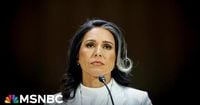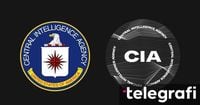On August 19, 2025, the U.S. intelligence community was rocked by a decision that sent shockwaves through Washington and beyond: Director of National Intelligence Tulsi Gabbard revoked the security clearances of 37 former intelligence and national security officials. Among those stripped of their clearances was Joel Willett, a former CIA officer and White House Situation Room staffer, who later described the move as "one of the most nakedly political acts in the history of the ill-conceived role in which she serves," according to the Louisville Courier Journal.
But the controversy didn’t stop there. Just days later, Gabbard’s office inadvertently revealed the name of an undercover CIA officer specializing in Russian affairs. The agent’s identity appeared on the same list of officials whose clearances had been revoked, a list that was published without coordination with the CIA. According to The Wall Street Journal and Telegraph, Gabbard was unaware that the officer was undercover—a mistake that quickly escalated tensions between her and CIA Director John Ratcliffe.
The incident was more than a bureaucratic blunder; it became a flashpoint in a widening rift at the top of America’s intelligence apparatus. As reported by NBC News and UNN, agency employees expressed deep concern, and insiders described the episode as a new chapter of growing discord between Gabbard and Ratcliffe. This was not their first clash. Earlier in August, Gabbard had declassified a document about Russian interference in U.S. elections, a move that had already set nerves on edge within the CIA.
For Willett, the timing of his own clearance revocation was difficult to ignore. His interest in running for the U.S. Senate had been reported by the Lexington Herald-Leader on August 6, and exactly two weeks later, his security clearance was revoked via social media. “You can do the math,” Willett wrote, suggesting a clear link between his political ambitions and Gabbard’s decision. He argued that her actions were less about national security and more about serving "one man, and not the American people"—a thinly veiled reference to President Donald Trump.
Gabbard, for her part, defended the clearances revocation as a crackdown on the "politicization or weaponization of intelligence." During a cabinet meeting on August 26, President Trump himself praised Gabbard, telling her, "You found interesting things, Tulsi. She's becoming more and more of a star every day," according to NBC News. The public endorsement was seen by many as a signal that Gabbard’s moves had the White House’s blessing, and some former officials told NBC News that she was under pressure to regain the president’s trust after a period of strained relations earlier in the year.
The roots of this drama stretch back years, tracing the fault lines of American politics and the perennial struggle between the intelligence agencies and the executive branch. During Barack Obama’s presidency, similar power struggles played out between then-Director of National Intelligence Dennis Blair and CIA chief Leon Panetta. But as one former official told NBC News, this time the stakes feel higher, with Gabbard "doubling down on accusations against former Democratic administrations and punishing members of the perceived 'deep state' bureaucrats who oppose Trump."
Willett’s own journey from the Kentucky Army National Guard to the White House Situation Room is emblematic of the kind of public service he believes is now under threat. He enlisted at 17, just months after the September 11 attacks, and later served with the FBI and CIA, providing "nonpartisan, apolitical intelligence support" to President Obama. After leaving government in 2015 to care for his family in Kentucky, he became a CEO in the private sector but continued to speak out against what he saw as the politicization of intelligence—especially under Trump.
"Ms. Gabbard’s shameless weaponization of the government against Donald Trump’s perceived political enemies, whether in response to my exercise of constitutionally protected speech or my consideration of running for office, should give everyone pause," Willett wrote in the Louisville Courier Journal. He warned that such actions "stifle much needed national security debate and will deprive the government of valuable expertise," ultimately making "Americans less safe and America less free."
The accidental outing of the undercover CIA officer only deepened the sense of crisis. The publication of the agent’s name—linked to reports on Russian election interference and calls for Trump’s impeachment—was not coordinated with the CIA and sparked immediate conflict with Ratcliffe, as reported by Telegraph. The Wall Street Journal confirmed that Gabbard was unaware of the officer’s undercover status, but the damage was done. The event, said intelligence sources to NBC News, "caused concern among agency employees" and highlighted the unpredictable consequences of what many see as a broader purge of career officials deemed insufficiently loyal to the current administration.
Some observers view the episode as part of an ongoing battle for influence within the intelligence community. In the past, such struggles have led to resignations and public controversy, but this time, the stakes are heightened by the broader political environment and the perception of a "purge" targeting those who have criticized or opposed Trump. The revocation of clearances and the naming of the undercover agent, said one former official to NBC News, "reflect a battle between Gabbard and Ratcliffe," but also a wider effort to expose and punish political enemies within the bureaucracy.
The reverberations of these decisions are likely to be felt for years to come. While Gabbard’s supporters argue that she is rooting out political bias and restoring integrity to the intelligence community, critics warn that the weaponization of security clearances and the exposure of covert officers will have a chilling effect on public service and national security. As Willett put it, "We should all be proud – not of me, but of our country in enabling stories like mine." Yet he fears that current trends threaten to close the door on such stories for future generations.
In the end, the controversy over Gabbard’s actions has become a litmus test for the boundaries between politics and national security. With trust between key agencies at a low ebb and the specter of political loyalty tests looming over the intelligence community, the nation faces hard questions about the cost of such battles—and whether the pursuit of political advantage is making America stronger or more vulnerable.



